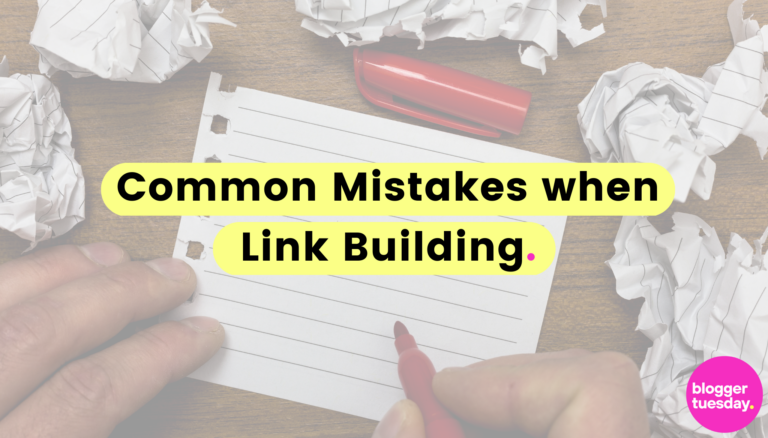Link building is an art and there are some easy mistakes you can make. Find out how to avoid them for your blog’s SEO strategy.
Link building is the practice of actively sourcing backlinks to your website or blog. Quality links to your site help to raise its profile in search engines, making link building an excellent SEO activity. Link building is, along with content, one of the two top ranking factors on Google for target keywords.
However, if you’re going to practise link building, you need to be able to do it correctly. There are many mistakes that you could make when trying to gain more links to your blog, and they could end up having the opposite effect to what you want. Poor link building practices could mean your site is penalised by search engines, rather than recognised for the right reasons.
If you want to use link building as part of your SEO strategy, here are some of the common mistakes that you need to avoid.
Image from Pixabay – CC0 Licence
Using Unreliable Link Building Services
Link building and SEO services can help you to build links, saving you time and lending you their expertise. However, not all services are equal, and many people make the mistake of choosing the wrong one. While some link building services are reliable and will help you to secure quality links, others will do the bare minimum to put your links anywhere they can. Some of them may even use unethical black hat methods to achieve this.
So how do you prevent this from happening? If you only want quality links that are secured in an ethical manner, be careful about which SEO or link building service you choose. Reading reviews is always smart if you want to ensure you’re using a reliable service. Pick an established agency or a freelancer with a proven track record to ensure you’re getting the backlinks that you deserve.
Not Having Good Content to Link To
Quality links back to your blog are important but don’t forget about what those links are actually linking to. The backlinking website might be good, but poor-quality content as your link could have a negative impact. It’s important to choose the right page to link to and ensure it has good, relevant content.
Many people choose to create a landing page, or multiple pages, to use for link building. Whether you do this or link to existing pages, make sure you provide helpful, informative content that will be useful to people who click on your link. The number of backlinks a web page has is directly related to the amount of organic traffic it receives, so quality, search engine optimised content is a must.
Always Linking to the Same Page
Having a landing page to link to can be a smart idea, but it’s a good idea to avoid linking to the same page all the time. You’re aiming to improve the expertise, authority, and trust of your website, so don’t limit the content you choose to link to. Try to mix it up a little and use different pages for your links. In fact, considering only 2.2% of content gets links from more than one website, it makes sense to have more pages to link to.
Irrelevant Links
Finding quality, high-authority websites to link back to your site is one thing, but it might not mean much if the links aren’t particularly relevant. If the page linking back to your site doesn’t really have much relevance to what it’s linking to, it won’t be seen as good quality by either search engines or users. When someone clicks on the link and it takes them to a page that isn’t helpful for them, they’re likely to simply leave as soon as they arrive. Make sure you’re looking for backlinking sites and content that are within your niche so that your links will make sense.
It’s important to consider user intent when you are looking for sites to link back to your page. User intent is the reason someone is searching online, which affects which links they click on. If their intent is to find information about gardening and the blog post they click on then links to your blog about sports, it won’t match the user’s search intent.
Image from Pixabay – CC0 Licence
Using Exact Anchor Text Too Much
Anchor text is the text that links to your page, and choosing which text to use is an important part of placing links correctly. It can be a good idea to use anchor text that directly matches relevant keywords, but it’s not always a good idea to do this. If you do it too much, it could have a negative impact. Google and other search engines might see overuse of exact anchor text as spammy and you could also be missing out on a broader range of keywords that help you get more traffic.
Instead of only using exact anchor text, make sure you explore keyword variations. Adding some variety can be beneficial for your overall link building strategy.
Putting Quantity Over Quality
One of the biggest mistakes many people make when link building is to focus on getting as many backlinks as possible, with no regard for quality. If you have plenty of backlinks but they’re not good, you’re likely to do damage rather than actually raise the reputation of your blog. It’s much more valuable to focus on getting good links than to only concentrate on getting lots of them. 93.8% of link builders say that the quality of the link is more important than the quantity.
Ignoring On-Page SEO
Link building should be part of a solid SEO strategy, so you can’t do it in isolation. It’s important to make sure you’re thinking about on-page SEO and other aspects of search engine optimisation. Look for any on-page issues that might need fixing and make sure you include your target keyword on the page too. Take a look at your internal linking in addition to thinking about external links.
Link building can be tough to get right, but avoiding some common mistakes can help you to master it. Good link building will boost your site’s SEO performance.


